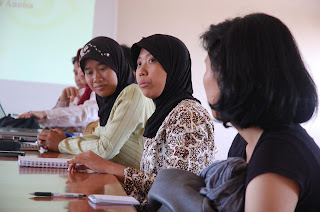By: Kemi Harahap
13 July 2009
Indonesia might not be the same as every other Asian or Islamic nations. In the past 10 years, we have seen a tremendous change in the women's rights movement in this archipelago. A female women has once lead this nation, setting an example for many patriarchal nations. A domestic violence act was legalized in 2004, marking the 8 year collaboration between numerous Indonesian organizations as a huge success.
One of the non-governmental organizations (NGOs) which played a part in the creation of the domestic violence act is 'Rifka Annisa'. Founded in 1993 by a number of female activists, Rifka Annisa, or translated as “Woman's Friend”, aims to provide a number of services for women who are victims of violence.
Located in the outskirts of Yogyakarta, Rifka Annisa is not just an office, but a shelter for many women who are victims of abuse. It's bright and airy interior, with its balanced 'feng shui', creates an area that promotes both tranquility and warmth.
Although there have been major changes in women's rights in Indonesia, cases of abuse and violence are still reported. In fact, throughout 2008 there has been more than 300 cases of violence, which included domestic, dating, child abuse, sexual harassment and rape. These
cases show that there is still a grass-root problem within the mindset of the Indonesian community. Many factors, which include religion and culture, influences the mindset and practices of most Indonesians.
In Yogyakarta, the interpretation of Islam perceive cases such as polygamy and 'mahram' (where men must accompany women when they go out of the house) as righteous, whereby men's status is perceived to be higher. Men often use religious texts as justifications to their violent acts. Cultural contexts, such as the patriarchal nature of Javanese culture, also makes way for abuse and violence to happen. Generally, women are taught to be patient and to be obedient to their husbands.
It is because of this that the management of women crises is a very intricate procedure. Rifka Annisa provides an array of services which include counseling for female victims, counseling for abusive men, and shelters for victims and survivors. In addition to that, they also seek to promote and create awareness of women's rights through community service and advocacy.
Rifka Annisa places a major emphasis on the role of men in violence. Since 2007, they have established a counseling service especially for abusive men. At the same time, creating awareness on women's rights should not only happen on the individual level- as it is also
important to create awareness on the family, community level, and in the state system.
“To achieve gender equality, we need to include men!” Elli Nur Hayati, the director for Rifka Annisa stated. She said,“Men are not biologically violent, they are constructed to be violent. We seek to enlighten them with a new concept of masculinity”.
With support from large modern Islamic groups such as Majelis Ulama Indonesia (MUI-Indonesian Ulama Council), Muhammadiyah and Nahdlatul Ulama (NU), Rifka Annisa does not seek to challenge or debate the society's interpretation of Islam, yet they seek to enlighten the society on the fact that women suffer from polygamy, 'mahram' and forced
marriages, and that often cases such like these cannot be brought into current times. In fact, many texts in the Quran has supported this understanding of the religion. In addition, Rifka Annisa believes that counselling should be made obligatory for men who are guilty of domestic violence under the National Domestic Violence Act, as men play a significant role in preventing abuses and sustaining gender equality.
“Women jihad in the household, while men jihad in the community”, Mei Sofia Romas, a counsellor for Rifka Annisa said.
Victims of abuse can approach Rifka Annisa by contacting either the hotline service, email service or coming straight to the office. They can also contact the integrated service center, which is linked to the crisis center, hospital and also police.
“From there, both women and men alike are provided access to counseling that can help manage their crisis and hopefully, this sets a pathway to a happy and enlightened, religious family”.
*View more pictures of the day from our photo album
WRITER'S PROFILE: Kemi is pursuing her last semester as a Communication major and International Studies minor. She is among one of the Indonesian students in this trip and is of Javanese descendant (as well as Bataknese, Sundanese and Bugis) which justifies her fondness for sweets. She is in charge of the management of the In Search of Yogyakarta blog as well as the resident tweeter.
Subscribe to:
Post Comments (Atom)







Hello I have found your blog to be very interesting. I am a college student studying psychology. I live In Boone, North Carolina in U.S. and want to help women and children with my degree. I love Yogyakarta and might possibly live there one day. I am visiting next summer to see your beautiful city. I would love to give my email so we could keep in touch and maybe when I move there I can help there! My email is ridvannah@hotmail.com.
ReplyDeleteTerima kasih,
Shawn Miller